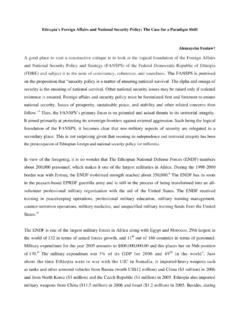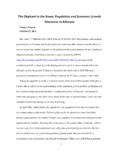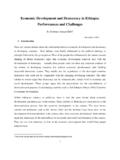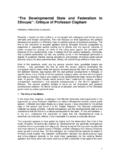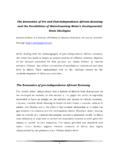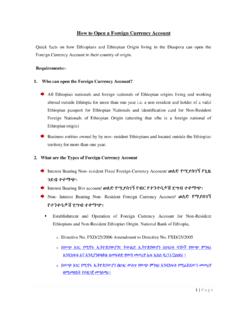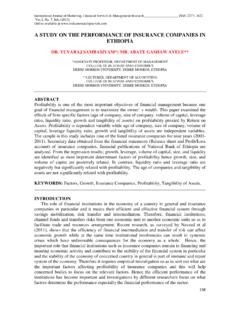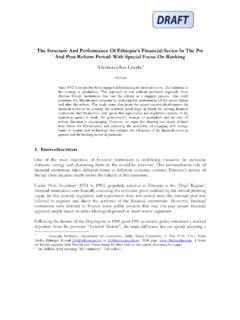Transcription of Banking Sector Reform in Ethiopia: An Abstract - …
1 1 Banking Sector Reform in ethiopia : An Abstract Admassu Bezabeh, , School of Business and Leadership, Dominican University of California San Rafael, California Desta, Asayehgn, School of Business and Leadership , Dominican University of California, San Rafael, California. The fragile and inefficient state-dominated Banking Sector that existed in ethiopia during the military government (1974-1991) was a major hindrance to economic growth. Since it took power in 1991, the current government has implemented a number of reforms. For instance, in 1994, the government legalized domestic private investment in the Banking industry. In addition, it restructured the two development banks as commercial banks, and introduced a new Banking and Monetary Proclamation that gave more autonomy and further clarified the national bank of ethiopia s activities as the regulator and supervisor of the Banking Sector .
2 Although the process has taken two decades, the Banking Sector remains repressed since the Reform process has been painstakingly slow and the policy measures implemented so far are not fully adequate. To date, these measures fall short of significantly improving the Banking Sector . It is not yet competitive and efficient, nor is it capable of accelerating the economic growth of the country which remains marginal. The government s concern that financial liberalization may lead to a Banking crisis that may culminate into an economic crisis is also misplaced. Empirical studies provide evidence that as regulatory and supervisory tools are upgraded and as supervision becomes increasingly vigorous, the probability of a Banking crisis significantly diminishes.
3 It is time to recognize this contradiction and it would be wise to begin the process of vigorous Reform to achieve financial strength. Global experience suggests that greater competition among domestic and foreign banks can bring greater benefits in the form of improving efficiency. Fundamental market-oriented measures are therefore needed to further strengthen the financial Sector in order to accelerate ethiopia s economic growth. 2 Therefore, the policy implications drawn from the study suggest that the Ethiopian Banking Sector needs to be tuned to the following additional market-oriented reforms in order to benefit positively from the harmonization of financial intermediation with economic growth.
4 These measures include 1) the privatization of the dominant state-owned Commercial bank of ethiopia ; 2) permitting entry of foreign banks; 3) allowing market forces to determine interest rates and the exchange rate of the ETB, and 4) upgrade the regulatory and supervisory ability of the national bank of ethiopia to restore the public s trust in the Banking Sector . 1: Privatization of State-owned Banks to Level the Competing Field Despite the government s decision to allow private domestic banks to be reestablished, reversing the nationalizing policy of the socialist military government, a lion s share of Banking business remains dominated by three state-owned banks, the Commercial bank of ethiopia , Development bank of ethiopia , and the Construction and Business bank .
5 In the Ethiopian Banking Sector , loans are not priced competitively by taking into consideration the risk of the borrower and the return of the loan to the lending bank . Instead Ethiopian banks in general follow the loan pricing policy adopted by the Commercial bank of ethiopia . In the absence of market forces in the credit market, credit is inevitably directed to inefficient borrowers outside the productive Sector of the economy. This practice inevitably denies capital to efficient firms and contributes to the build-up of non-performing loans in the state owned bank s portfolio. Several studies such as La Porta et al (2002) indicate that the performance of privately owned banks is better than state-owned banks.
6 According to the survey conducted by Access Capita, in ethiopia bank concentration defined as the asset share of the three largest banks was 100 percent in 1994 and down to percent in 1998. It progressed further downward to percent in 2006. This implies that the share of government owned banks also declined. According to Kiyatta et al., in seven out of nine years private banks had a higher ROA than state- owned banks. This is due to several factors: the spread has increased for both public and private banks and private banks have higher spreads than publicly owned banks. Therefore, since privately owned banks are superior in terms of efficiency and profitability, publicly owned banks need to be privatized.
7 2: Opening the Ethiopian Banking Sector to Foreign Participation 3 Despite heavy pressure from the United States Government, as evidenced from Wikileaks messages, the Ethiopian government continues by law to prohibit the entry of foreign banks to the country. Barriers to entry in the Banking Sector reinforce inefficient state-owned enterprises by shielding them from competition. The government s concern is that if foreign banks were to be allowed to operate in ethiopia , it may lose of control over the economy. This position is based on the infant industry argument. Prohibiting foreign bank entry at this time would prevent the domestic banks from being weakened because of unfair competition from foreign banks.
8 Two important questions must be answered when examining the issue of foreign bank entry to ethiopia . First, will foreign banks invest in ethiopia if the government reverses its stand and permits their entry? Second, once foreign banks start operations in ethiopia will they be assets or liabilities to the country? The answer to the first question is an unqualified yes since ethiopia presents a huge potential for bank profits for a number of reasons. To begin with, foreign banks have a number of advantages compared to domestic banks. By servicing client s active in more than one country, they can achieve benefits from spreading best-practice policies and procedures.
9 Second, they may be able to diversify risk better, allowing them to undertake higher risk, but also with potentially higher returns on investments. Third, foreign banks have advantages in the form of more diversified funding sources, including having access to external liquidity from their parent banks, which may lower their funding costs. Finally, by being larger they may achieve other scale advantages such as utilizing more advanced and sophisticated risk assessment models to give them a competitive edge over fragile Ethiopian banks. At the same time, foreign banks are likely to incur additional costs and face more obstacles when compared to domestic banks.
10 They may have less information compared to local banks on how to do business in ethiopia , putting them at a disadvantage, at least until they have been in the country for some time. Moreover, foreign banks might be exposed to discrimination by individual customers. Additionally, diseconomies might arise because of an institutional environment that is culturally different. However, these costs remain a small fraction of the huge revenue benefits they are likely to generate by operating in 4 ethiopia . As Aghion and Howitt (1998) pointed out, successful foreign banks that have learned to work in a competitive environment with demanding customers in their home countries have learned to innovate, pursue new business segments, and adjust to changing circumstances.

